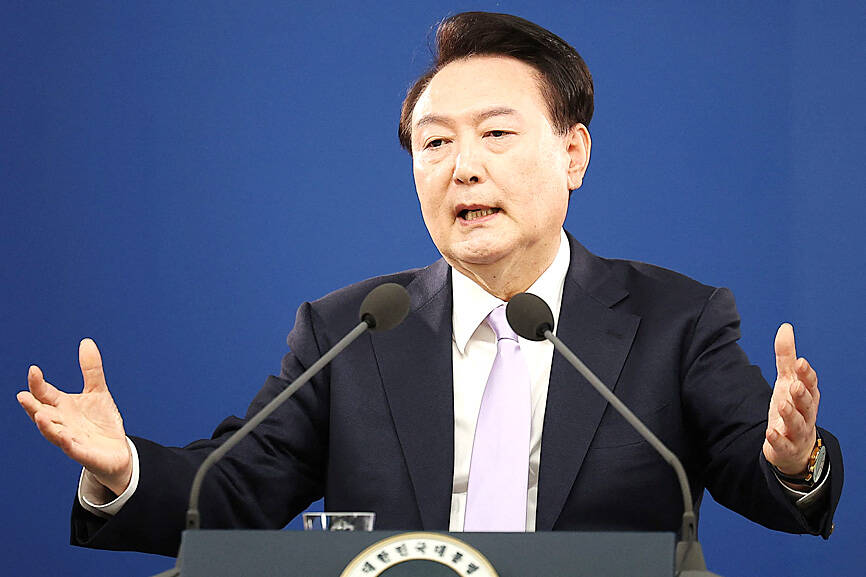Law enforcement officials yesterday requested a court warrant to detain impeached South Korean President Yoon Suk-yeol as they investigate whether his short-lived martial law decree on Dec. 3 amounted to rebellion.
The Corruption Investigation Office for High-Ranking Officials, which is leading a joint investigation with police and military authorities into the power grab that lasted only a few hours, confirmed it requested the warrant from the Seoul Western District Court. They plan to question Yoon on charges of abuse of authority and orchestrating a rebellion.
Yoon Kap-keun, the president’s lawyer, denounced the detention attempt and filed a challenge with the same court, arguing that the warrant request is invalid. He also claimed the anti-corruption agency lacked the legal authority to investigate rebellion charges.

Photo: AFP
However, he evaded answering how the legal team would respond if the court approved the warrant for the president’s detainment.
“An incumbent president cannot be prosecuted for abuse of power,” the lawyer said. “Of course, there are differing academic opinions on whether a president can be investigated for abuse of power and some assert that investigations are possible, but even when investigations are allowed, the prevailing opinion is that they should be exercised with the utmost restraint.”
The anti-corruption agency did not immediately respond to the lawyer’s comments.
Han Min-soo, spokesperson of the opposition Democratic Party, called for the court to issue the warrant, saying Yoon Suk-yeol’s detainment would be the first step toward “ending the rebellion and restoring normalcy.”
The warrant request came after Yoon Suk-yeol dodged several requests by the joint investigation team and public prosecutors to appear for questioning and also blocked searches of his offices.
While Yoon Suk-yeol has presidential privilege of immunity from criminal prosecution, such protections do not extend to allegations of rebellion or treason.
It is not clear whether the court would grant the warrant or whether Yoon Suk-yeol can be compelled to appear for questioning.
Locations potentially linked to military secrets cannot be seized or searched without the consent of the person in charge and it is unlikely that Yoon Suk-yeol would voluntarily leave his residence if he faces detention. There are also concerns about possible clashes with the presidential security service if authorities attempt to forcibly detain him.

CHIP WAR: The new restrictions are expected to cut off China’s access to Taiwan’s technologies, materials and equipment essential to building AI semiconductors Taiwan has blacklisted Huawei Technologies Co (華為) and Semiconductor Manufacturing International Corp (SMIC, 中芯), dealing another major blow to the two companies spearheading China’s efforts to develop cutting-edge artificial intelligence (AI) chip technologies. The Ministry of Economic Affairs’ International Trade Administration has included Huawei, SMIC and several of their subsidiaries in an update of its so-called strategic high-tech commodities entity list, the latest version on its Web site showed on Saturday. It did not publicly announce the change. Other entities on the list include organizations such as the Taliban and al-Qaeda, as well as companies in China, Iran and elsewhere. Local companies need

CRITICISM: It is generally accepted that the Straits Forum is a CCP ‘united front’ platform, and anyone attending should maintain Taiwan’s dignity, the council said The Mainland Affairs Council (MAC) yesterday said it deeply regrets that former president Ma Ying-jeou (馬英九) echoed the Chinese Communist Party’s (CCP) “one China” principle and “united front” tactics by telling the Straits Forum that Taiwanese yearn for both sides of the Taiwan Strait to move toward “peace” and “integration.” The 17th annual Straits Forum yesterday opened in Xiamen, China, and while the Chinese Nationalist Party’s (KMT) local government heads were absent for the first time in 17 years, Ma attended the forum as “former KMT chairperson” and met with Chinese People’s Political Consultative Conference Chairman Wang Huning (王滬寧). Wang

CROSS-STRAIT: The MAC said it barred the Chinese officials from attending an event, because they failed to provide guarantees that Taiwan would be treated with respect The Mainland Affairs Council (MAC) on Friday night defended its decision to bar Chinese officials and tourism representatives from attending a tourism event in Taipei next month, citing the unsafe conditions for Taiwanese in China. The Taipei International Summer Travel Expo, organized by the Taiwan Tourism Exchange Association, is to run from July 18 to 21. China’s Taiwan Affairs Office spokeswoman Zhu Fenglian (朱鳳蓮) on Friday said that representatives from China’s travel industry were excluded from the expo. The Democratic Progressive Party government is obstructing cross-strait tourism exchange in a vain attempt to ignore the mainstream support for peaceful development

ELITE UNIT: President William Lai yesterday praised the National Police Agency’s Special Operations Group after watching it go through assault training and hostage rescue drills The US Navy regularly conducts global war games to develop deterrence strategies against a potential Chinese invasion of Taiwan, aimed at making the nation “a very difficult target to take,” US Acting Chief of Naval Operations James Kilby said on Wednesday. Testifying before the US House of Representatives Armed Services Committee, Kilby said the navy has studied the issue extensively, including routine simulations at the Naval War College. The navy is focused on five key areas: long-range strike capabilities; countering China’s command, control, communications, computers, cyber, intelligence, surveillance, reconnaissance and targeting; terminal ship defense; contested logistics; and nontraditional maritime denial tactics, Kilby